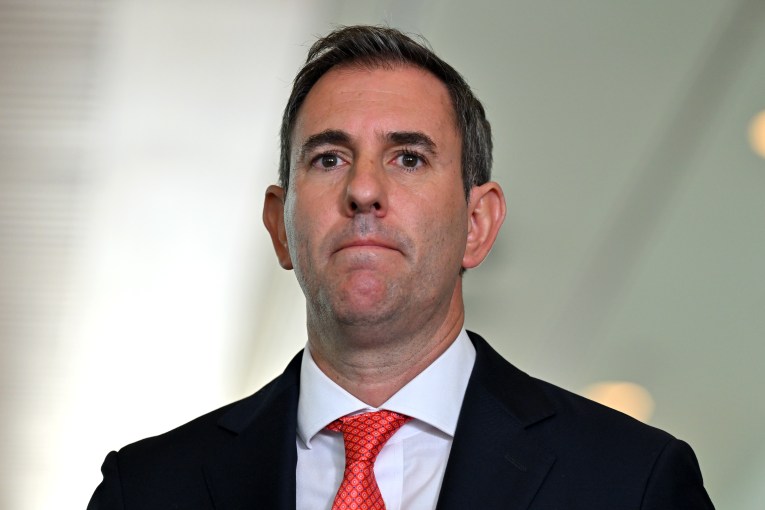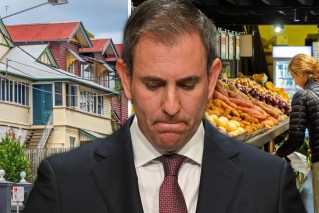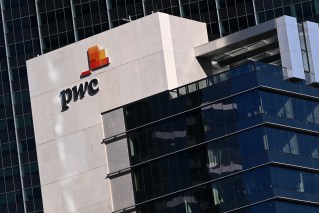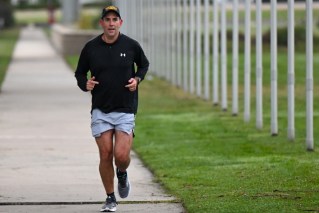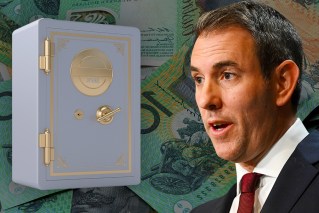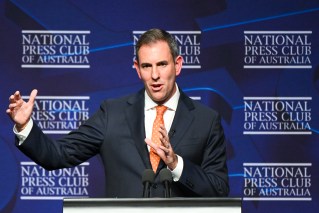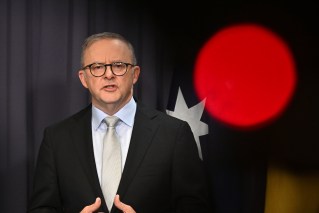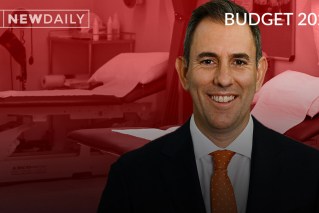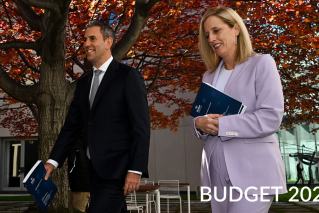Chalmers defends budget’s ‘meaningful’ help amid split on interest rate risks

Treasurer Jim Chalmers has defended his second budget as offering “effective, meaningful relief to households” facing spiralling living costs – while not contributing further to inflation woes.
Dr Chalmers also took aim at the former Coalition government for “leaving a steaming pile of fiscal irresponsibility”, as economists were split on the effect of Tuesday’s budget on future interest rate rises.
“Of the total spending we announced for next year, more than a quarter of the net impact, relates to keeping existing government programs going and extending pandemic support,” Dr Chalmers told the National Press Club in Canberra on Wednesday.
“In total, the targeted relief that we’re delivering in 2023/24 costs around 0.1 per cent of GDP.
“It’s been designed to provide effective, meaningful relief to households throughout the year; not in one big hit.”
“For all these reasons, the Treasury’s advice to us was that none of what we’re doing here will have a counterproductive impact.”
Dr Chalmers said the budget – the feature of which was a $14.6 billion cost-of-living relief package – had been focused on areas where price pressures were hitting hardest. He said that would take the pressure off inflation “and that means inflation will be lower in 2023 … than what we forecast in October”.
“[It is] still higher than we’d like, and still more persistent than is ideal but down on what it would have been,” he said.
“Inflation was central to our thinking and how we went about providing relief to households in the execution of our fiscal strategy but also in how we thought about growth.”
The budget noted that Australia’s inflation rate has peaked, after reaching a three-decade high of 7.8 per cent in the three months to December 2022. It was at 7 per cent in the March quarter.
Treasury expects the annual rate of inflation to be back in the 2-3 per cent band in 2024/25 when it’s forecast to fall to 2.75 per cent from 6 per cent this financial year.
“The fact that the cost of living package only adds 0.1 per cent of GDP in that period, the fact that our energy plan, the combination of the price caps and the bill relief takes three-quarters of a [percentage point] off inflation next year, all of these things, I think, are important demonstrations for why so many of the bank economists in particular have come out today and said at worst the impact on the economy is neutral and many of them have said better than that,” Dr Chalmers said.
Later, in Question Time, Dr Chalmers reeled off a string of opinions from economists, describing the budget as “broadly neutral”. He also took aim at the opposition for its criticisms.
“A big chunk of the spending that we had to do in 2324 is because[the former Coalition government] announced ongoing programs and only funded them in a temporary way,” he said.
“We had to clean up the mess. [The former government] left a steaming pile of fiscal irresponsibility and we had to clean it up. We take responsibility for doing that.
“We made progress in a budget last night it would take the pressure off inflation rather than add to it. That is the considered view of the Treasury, that is a considered view of a number of economists.”
Independent economist Chris Richardson, of Rich Insights, said the budget lacked the hard decisions needed to allow the Reserve Bank to lean away from rate rises because it was pumping money into the economy.
He welcomed the lift to JobSeeker and other assistance but said that should have been accompanied with offsetting money-saving and revenue-raising measures.
“To be fair to this government, a lot of the spending they’ve done, they needed to do – they just also needed to make other decisions to save money to take pressure off,” Mr Richardson told Sky News.
He said the government could have taken the opportunity to raise more revenue, noting that adjustments to the petroleum resource rent tax were “much too modest”.
BetaShares chief economist David Bassanese said the forecast economic growth could give the RBA reason to lift interest rates “at least once”.
“The second Labor budget under Treasurer Jim Chalmers is unambiguously expansionary, with a boost to GDP growth equivalent to around 1.5 per cent over the next two years,” he told the ABC.
“This adds to the risk that the RBA will feel the need to raise interest rates at least once and possibly twice more in the coming months.”
Mr Bassanese told the ABC the budget was a “smoke and mirrors” exercise that pulled focus on its $4.2 billion surplus, drawing attention away from subsequent years of deficits.
Over at the big banks, senior ANZ economist Adelaide Timbrell said the budget appeared fairly neutral on inflation.
The ANZ expected the RBA to lift the official cash again in August, to 4.1 per cent, she told The Guardian. It was then predicting a cut, but not until late in 2024.
Judo bank chief economist Warren Hogan – one of the few to correctly tip the Reserve’s surprise rate rise last week – told the outlet the extra spending had to be weighed against the end of some other programs such as the low- and middle-income tax earner offset.
Mr Hogan still expects one more official rate hike in 2023.
Elsewhere, opposition finance spokeswoman Jane Hume said the budget should have done more heavy lifting to drive down inflation.
“Looking through the budget papers, every line says this isn’t inflationary,” she told Sky News on Wednesday.
“But that’s not enough – is it actually reducing inflation, and if it is, well where, because we can’t find a policy that has a sustained deflationary effect.”
-with AAP
